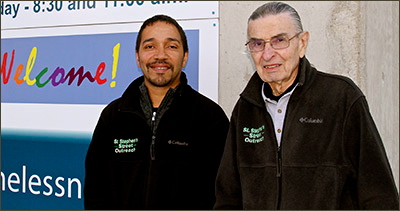
In 2010, Joseph Desenclos quit his job in the private sector to become a street outreach worker at St. Stephen’s Human Services. Two years later, he was promoted to street outreach program manager.
The career change was a long time coming.
“Up until the 1990s, I believed that if I had certain material things, I’d be happy and successful,” Desenclos said, from his office at Central Lutheran Church. But after years of accruing possessions, he realized that, “I hadn’t had joy in my life for a long time.”
One day Desenclos went to a Caribou Coffee in St. Paul to “soul search.” He borrowed a pen from a customer and started scrawling things that might make him happy on a napkin. After six hours, he’d winnowed the list to four. “Get involved in social work” was at the top.
Several months later, Desenclos began working as a homeless advocate with Catholic Charities’ Dorothy Day Center. He was employed there from 1999 to 2003.
In October 2010, after seven years back in the private sector, Desenclos realized that he needed to return to social work. He identified the organizations he wanted to work for by walking in off the streets and applying for their services. “I wanted to see first-hand how an organization treated its clients and if they provided accurate referrals,” he explained. From this process, he selected St. Stephens as a potential employer. In his cover letter, Desenclos detailed his philosophy for dealing with people in poverty: “Despite my education and experience, I will never consider myself the expert in anyone’s life because that would be one more hurdle they would have to overcome to achieve self-sufficiency.”
That philosophy — that people intuitively know what is best for them — continues to shape his work.
In October 2014, Desenclos and Renee Nyman, St. Stephen’s lead outreach street worker, gave a training on street outreach, where they offered tips for navigating the job safely and effectively.
Desenclos advised street outreach workers to be conscious of “power dynamics” in their encounters, explaining that when he interacts with people on the streets he positions his body at or lower than his clients’ and sits or crouches beside them, not in front. His goal in every encounter is to “get the person to talk more than me.” It’s also important to stay up-to-date on available community resources, so that when someone reveals their needs and motivations, the street outreach worker can readily connect them to ones that are most appropriate.

Breanna, St. Stephen’s outreach worker
Another point he raised was the importance of social connectedness. “We can place people in housing, but we need to do a better job of integrating people into their community,” he said. A big part of this integration is identifying a client’s purpose. “I’ve learned that everyone wants a purpose in life and that most people had a purpose before they started living on the streets,” he said. Therefore, Desenclos’ job “is literally finding out what are their hobbies, what did they like to do in their free time before they were homeless.”
He mentioned a 55-year-old woman he worked with who would panhandle and crochet scarves on Nicollet Mall to pass the time. On one of his outreach shifts, Desenclos caught her crying. She explained that someone had stolen her backpack full of crocheting materials.
Desenclos realized that, in addition to locating the client stable housing, it was important to consider her hobbies. He located a community member who was willing to donate crocheting materials. Then he found a community center in the neighborhood that the client was moving into that offered a sewing, knitting, and crocheting group for seniors. The woman’s health improved as a result of her involvement there. “She ended up developing friends with similar interests,” he said.

A homeless client’s artwork hangs on the walls of Central Lutheran Church
Finally, Desenclos believes that observation and flexibility are integral to his work. “Really good outreach is just being in an area and looking around without an agenda,” he explained.
St. Stephen’s currently has 130 people on its “unsheltered list” and is collaborating with Hennepin County on a plan to end homelessness by 2025. Desenclos believes the goal is feasible, and is excited by the rollout of a “coordinated assessment” that street outreach workers will administer to clients upon intake to ascertain their needs and motivations and to determine what types of services are appropriate for them.
Going forward, many of Desenclos’ ideas for how to improve street outreach come from seeing how it’s done in other parts of the country. While in Arizona in January 2014, he visited the Central Area Shelter System and brought back ideas about how to integrate paramedics into Minneapolis shelters in order to reduce ambulance calls and triage clients for health care services. Similarly, while in New Orleans for the 2014 National Health Care for the Homeless Conference, Desenclos roved the street near his hotel to talk to individuals experiencing homelessness.
“I learn more on the streets,” he said.
